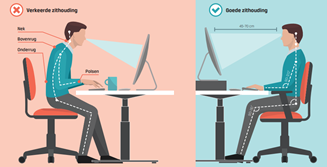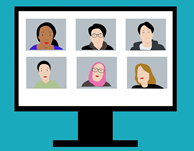The world has changed tremendously in the last year in all areas. For example, working from home has become part of everyday life for many of us. Where companies may have previously been reluctant to work remotely, in many places it is now integrated. Research shows that almost half of the employees telework and this also occurs several days a week. The benefits are often undeniable. However, as with all adaptations, working from home presents certain challenges.
Role conflicts, work-life balance and social isolation are issues that arise when working from home. In these strange times, working is different for everyone, both for home workers and for the people who are able to work on location. In this newsletter we will be focusing on working from home and how we can deal with it in a healthy way. Here are a few tips to take care of yourself while taking care of each other.
Tips for employees
Different people consider different areas of life to be important and want to organise them differently. If you work from home, this could be problematic. Finding a good balance between your work and your personal life is therefore crucial to be able to work from home effectively. Below are a few tips that can help you with this.
A challenge that many people encounter when working from home is maintaining structure. For example, certain rituals and routines that signal the start of your work day disappear.  There is no commute, there are no coffee breaks with colleagues and very often lunch breaks are not taken at a certain time. Incorporating these rituals can help maintain structure. For example, you can build in a fictitious commute. Take a walk in the morning before you start working, for example. Also try to differentiate your workplace at home.
There is no commute, there are no coffee breaks with colleagues and very often lunch breaks are not taken at a certain time. Incorporating these rituals can help maintain structure. For example, you can build in a fictitious commute. Take a walk in the morning before you start working, for example. Also try to differentiate your workplace at home.
Keep your workplace for work and not for relaxing. But sometimes that is simply not possible. In that case, you can put your laptop aside or tidy up your desk every evening. Clothing can also help you with this. Reserve certain outfits to relax in and certain ones to work in. You probably won't feel as productive in pyjamas, so you should avoid wearing them all day long. You can also make agreements with your roommates and your family about when you will or will not be available. You can have lunch and breakfast together, or take a walk together after work.
Create a clear daily schedule. It is best to schedule your breaks in advance. If these are not scheduled, it is much more likely that you will skip them. Try to set up a daily structure like at work, with regular breaks. A technique that can help with this is the 'Pomodoro' technique. This involves setting a (kitchen) alarm clock in intervals of focus (e.g. 50 min) and relaxation (e.g. 5 min). Use these short breaks to stretch or do some relaxation exercises (which you can find on EAP-online). Try to set clear goals for yourself every day. Good time management is important to stay motivated and organised.

Your workplace is an important factor in working from home effectively, because you spend eight hours a day there. Many people are not equipped to work from home. But try to make your workplace as ergonomic as possible. You can make different adjustments by being creative with your environment. For example, use books to raise your laptop or put blocks under a low table to make it higher. Also try to stand up regularly, because you also do this at the office. Movement is definitely important if you are working from home. You can incorporate this by walking around during phone conversations, for example.
The exceptional circumstances of Covid-19 often have an impact on our mental well-being. It may be harder to concentrate or you get stuck in some sort of procrastination. This is a normal and human response, so be sure to ask for help from your manager or seek support from your team. During these weird times, be extra alert for stress symptoms. This can manifest itself both physically and mentally. Persistent fatigue, trouble sleeping, worrying, a gloomy mood, headaches, muscle aches, a change in appetite or stomach pain and heart palpitations can all be symptoms of stress. If you notice these symptoms, you can always consult your doctor. The EAP is always there for you in case of stress, burnout or other concerns.

Tips for teams
Collaborating and staying in touch with your team can be difficult if there is no physical contact. Some people feel isolated or the group atmosphere may fade away. It is important to focus on the connection with your colleagues. Clearly differentiate between formal and informal moments and use every opportunity for social interaction.  Online coffee moments or end-of-the-day meetings can maintain the informal contact. Discuss which media you will use for this. Involve every colleague in maintaining these contacts. Always pay attention to differences here. Everyone's situation is different and everyone has different needs during these times.
Online coffee moments or end-of-the-day meetings can maintain the informal contact. Discuss which media you will use for this. Involve every colleague in maintaining these contacts. Always pay attention to differences here. Everyone's situation is different and everyone has different needs during these times.
The foundation of every team is mutual trust. This is definitely important when a lot of the work is done individually and remotely. Try to eliminate uncertainty and unreliability: clarity and communication are crucial in this. Be trustworthy: show that you are listening and paying attention when communicating. Make an agreement with the team that the cameras should be on during meetings. Make sure you are on time and notify your colleagues if you will absent. Make clear agreements about who should be present at which meetings and how you can communicate this clearly. Determine how quickly you should respond to the different communication channels.
A nice way to stay in touch could be an internal blog or a chat group. Any colleague can post things that happen outside of work there. That way you can still stay up to date on each other's lives. You can also post informal announcements there or talk about a having a hard day at work. Online games and quizzes can be a relaxing way of team building and contact.
Tips for managers
As a manager you are often used to seeing and supporting your team on a daily basis. Working from home can make you feel like you're losing your connection with certain employees. You may also be concerned about the mental well-being of your team and wonder how you can make a difference. There are several things you can do to support your team during these strange times, here are some tips.
As a manager you have to trust your team and your employees. When working from home you may feel like you have no overview of what everyone is doing. However, it is important to give your team the maximum autonomy and space to organise their work. You can participate in certain assignments yourself, where possible and relevant. Clear and transparent communication is also crucial here, as well as fairness and honesty. As a manager, trust that your employees are reliable and motivated.  Most companies don't monitor the hours when working from home. It's more important and more useful to focus on the results instead of the number of hours that someone is working. After all, working long is not the same as working effectively. As a manager, try to give your team clear objectives and go over them regularly. That way, as a manager you can maintain an overview. Also give your team feedback about this and acknowledge the achievements of individual employees and the team as a whole.
Most companies don't monitor the hours when working from home. It's more important and more useful to focus on the results instead of the number of hours that someone is working. After all, working long is not the same as working effectively. As a manager, try to give your team clear objectives and go over them regularly. That way, as a manager you can maintain an overview. Also give your team feedback about this and acknowledge the achievements of individual employees and the team as a whole.
As a manager, you have to set an example. You have the opportunity to support your team in how to deal with working from home (long-term). Always try to be congruent and consistent in this. People mainly learn implicitly. When you make certain things, such as mental well-being, a topic for discussion, you often make it easier to seek help.
Show your team that you maintain a good work-life balance yourself and demonstrate how you deal with work pressure. Allow yourself to be vulnerable in this, it's ok to show your team that you are human. The past year has been difficult for everyone, by making this open for discussion, you are opening the door to honest communication.
Research shows that appreciation is very important to employees. In fact, this is often the most important factor in determining whether someone feels good at work. As a manager, when you show your appreciation or give people a compliment, you are making time for the things that are going well and you are explicitly acknowledging this. Showing appreciation is also a form of giving feedback; you are showing someone that he or she is doing a good job. If there is enough appreciation, it will promote productivity and the relationship with your employee.
Appreciation exercise : Think of two people with whom you do not always get along or who have annoyed you this week.  Consider these people for a moment. How do they feel about life? What does their home situation look like? Challenge yourself to give these people positive feedback or an appreciative compliment in the coming week. How do these people react to this? Have you noticed any effect on their motivation or in your relationship? How did that feel to you? What can you learn from this as a manager? If you find that this is difficult for you, you can always contact the EAP. As a manager you can always contact the EAP for support and information as well.
Consider these people for a moment. How do they feel about life? What does their home situation look like? Challenge yourself to give these people positive feedback or an appreciative compliment in the coming week. How do these people react to this? Have you noticed any effect on their motivation or in your relationship? How did that feel to you? What can you learn from this as a manager? If you find that this is difficult for you, you can always contact the EAP. As a manager you can always contact the EAP for support and information as well.
Would you like to find out more?
Would you like support in changing your situation, your behavior, your feelings and/or your thoughts? Consider the EAP. You are welcome to ask us any questions you may have. Go to the 'helpdesk' page on www.eap-online.eu and find out how you can contact us.
The “Test and tools” page will give you access to HappyCare. Be sure to also consult our extensive library: you will find a multitude of articles on wellbeing-related topics you can access, so that you can already get a number of tips and tricks out of it.
